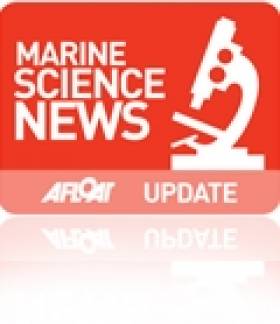Displaying items by tag: Horizon 2020
Cross-Cutting Marine Opportunities in EU Funding For Research & Business
#MarineScience - The Marine Institute is hosting a one-day event for marine researchers and SMEs looking at cross-cutting opportunities in Horizon 2020 and the Interreg Atlantic Area Programme.
The first part of the day, on Thursday 7 January 2016 from 9.30am to 5.30pm, comprises a half-day course delivered by Dr Seán McCarthy on how to write a competitive proposal for Horizon 2020.
The aim of this course is to train researchers, research managers and research support services in writing professional and competitive proposals for the 'blue growth' programme.
It will describe the relevance of Horizon 2020 to EU policies, and identify common problems in proposal writing and the success criteria for proposals.
The course provides tips on how to collect information, how to select strategic partners and how to avoid duplication in proposal writing. The final section describes a strategy for proposal writing.
Later, Michael O'Brien of the North & Western Regional Assembly will hold an information session on the Interreg Atlantic programme.
This programme area is rich in maritime heritage and marine resources and boasts a strong Atlantic cultural identity. The area is also challenged by ongoing deficits in innovation and SME competitiveness capacity as well as environmental threats including climate change and threats to the biodiversity of the Atlantic area.
The agreed Programme Priorities respond to these challenges and will furthermore exploit opportunities in niche areas such as green growth, renewable energies and eco-Innovation.
The eligible priorities for the 2014-2020 programme period are:
- Stimulating innovation and competitiveness.
- Fostering resource efficiency.
- Strengthening the territory's resilience to risks of natural, climate and human origin.
- Enhancing biodiversity and the natural and cultural assets.
In the afternoon there will be opportunities for one-on-one advisory meetings with national contact points. Meeting rooms will also be available for breakout sessions if required.
For more information on the day and how to attend, visit the Marine Institute website HERE.
#BlueGrowth - The first projects funded under the EU's Horizon 2020 programme for 'blue growth' will be launched at a conference in Brussels next month.
The Atlantic - Our Shared Resource: Making the Vision Reality will be held at the Palais d'Egmont from 16-17 April.
It marks a "new exciting stage" in implementation of activities signposted in 2013's Galway Statement on Atlantic Ocean Co-operation.
And it's sure to inform the discussions at this July's Harnessing Our Ocean Wealth Conference in Cork Harbour.
Details on registration for the conference are available HERE.
Maritime Research To Get Special Attention At Horizon 2020 Programme Launch
#Horizon2020 - The national launch of Horizon 2020, the European Union’s new €80 billion programme for research and innovation to create new growth and jobs in Europe, will take place in the Dublin Convention Centre on Tuesday 10 December.
This event is free to attend, and registration is available online at the Enterprise Ireland website.
Horizon 2020 has an increased budget of nearly 30% in real terms compared with its predecessor, the Seventh Framework Programme for Research and Technological Development (FP7).
As a result of a new strategic programming approach, 12 'focus areas' have been identified for special attention. One of these, Blue Growth: Unlocking the potential of the seas and oceans, means that marine/maritime research and innovation will receive special attention in Horizon 2020.
The areas of research that will be the focus of the first calls (2014/2015) are listed online HERE.
The EU Blue Growth Strategy (2012) recognises that seas and oceans are drivers for the European economy with great potential for innovation, economic growth and job creation. The strategy is the Integrated Maritime Policy's contribution to achieving the goals of the Europe 2020 Strategy for smart, sustainable and inclusive growth.
Implementation of the Blue Growth Strategy, including sea-basin programmes such as the EU Atlantic Action Plan (2014-2020), can be supported by EU co-funding programmes such as Structural and Cohesion Funds (eg INTERREG, Smart Specialisation), Horizon 2020 and the European Maritime and Fisheries Fund (EMFF).
The Irish marine research community, including small- and medium-sized enterprises (SMEs), benefitted greatly from FP7 (2007-2013), participating in 127 competitive and collaborative marine research projects drawing down grant-aid of over €48 million, of which 42% was shared between 39 SMEs.
This level of participation equates to circa 180 new marine science jobs in Ireland, and the figure increases to 270 jobs with the inclusion of both FP7 and INTERREG-IV marine projects over the period from 2007 to 2013.
Irish successes include MARINET (Marine Renewables Infrastructure Network for Energy Technologies), led by University College Cork, and ASIMUTH (Applied simulations and integrated modelling for the understanding of Toxic and Harmful Algal blooms), led by the Bantry-based Daithi O’Murchu Marine Research Station (DOMMRS) and which won the 2013 COPERNICUS Award for the best earth-monitoring service for European citizens.
Other projects led by Ireland include: MarineTT (European Marine Research Knowledge Transfer and Up-take of Results), led by AquaTT (Dublin); BAMMBO (Sustainable production of biologically active molecules of marine origin), led by the Limerick Institute of Technology; and CORALFISH (Assessment of interactions between corals, fish and fisheries in the deep waters of Europe and beyond), led by NUI Galway.
The Marine Institute participates in 28 projects including the strategic MyOCEAN (Development of upgraded GMES Marine Core Services) and EuroFLEETS (Towards an alliance of European Marine Research Vessel Fleets) projects.
Horizon 2020 funding is based on competitive calls that are open to everyone, including organisations and individuals from outside the EU. It is up to individual researchers, research organisations, companies or other organisations to get involved.
SMEs are encouraged to participate across the whole Horizon 2020 programme. They can engage in collaborative projects as part of a consortium, or seek support through a new dedicated SME instrument for highly innovative smaller companies.
The integrated approach and simplification efforts should lead to a minimum of 20%, or about €8.65 billion, of the total combined budgets of the specific objective 'Leadership in enabling and industrial technologies' (LEITs) and 'Societal Challenges' going to SMEs.
The SME instrument will be crucial in achieving this target. Over the course of Horizon 2020, at least €3 billion will be allocated to the SME instrument.
Full details on Horizon 2020 are included on the official Horizon 2020 website HERE.

























































